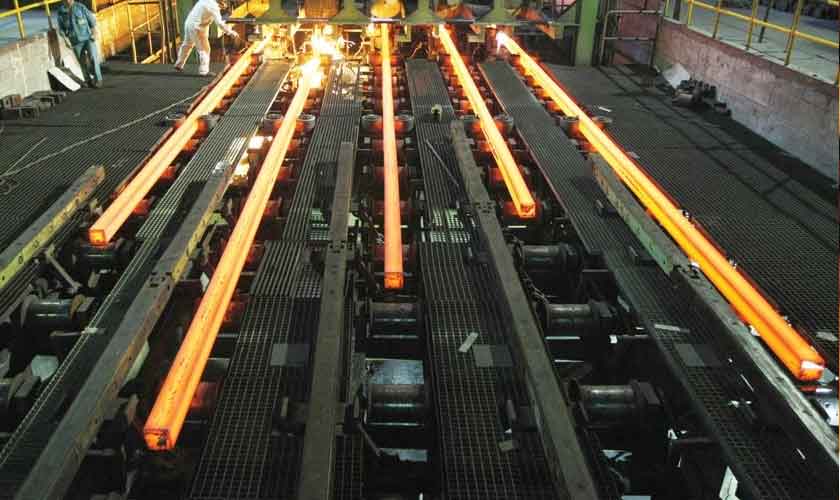‘Govt decides to revive PSM through public-private partnership’
ISLAMABAD: The government has decided to revive the loss-making Pakistan Steel Mills (PSM) under the public-private partnership (PPP) mode, which would cost up to $800 million, a senior official said on Tuesday.
“We do not have money to revive or upgrade the steel mills to raise its production level to 3 million tons per annum from its current capacity of 1.1 million tons,” Abdul Razak Dawood, adviser to the Prime Minister for Commerce, Textile, Industry and Investment told newsmen.
Dawood said a benefit of the PPP mode is that the strategic partner would not give in to political pressures as happened in 2008 when 5,000 unskilled employees were inducted into the mills. “We hope the international investors possess expertise to modernise the plant (PSM).”
The adviser said in the first phase – within one and a half-year – the plant would be revived to achieve its built-in capacity, while the production capacity would be jacked up to three million tons in the second phase.
Dawood said total steel demand in the country stands at nine million tons, which are increasing by 15 percent every year.
A group of experts advised the government that the PSM should not be privatised as it is a strategic asset of the country and instead it should be revived and run though public-private partnership. Hubco Chief Executive Officer Khalid Mansoor leads the group that comprises of Ruhail Mohammad, CEO of Hub Power Holding, Ahmed Zulfiqar Siddiqui of Hubco, Kamran Kamal, CEO of Laraib Energy Limited (a subsidiary of Hubco), Muhammad Ali of JS Group and Saleemullah Memon, CEO of Thar Energy.
The PM adviser said the Economic Coordination Committee (ECC) is set to grant a formal approval to the group’s recommendations in its next meeting and the summary would later be forwarded to the cabinet for approval. Later, the government would hire transactional advisor to develop parameters for the PPP mode.
Dawood said the mill was closed in June 2015 as Sui Southern Gas Company stopped gas supply to the PSM. After the close of the mill, the plants were left without maintenance and thereby the blast furnace and other equipment got rusted. Blast furnace has been rendered nonfunctional due to sudden halt of gas supply. Consequently, iron ore sludge has turned into a 13-feet high rock. “However, the mills can still operate with raw materials procured from other sources,” he added.
The group in a report to the government said the PSM could be refurbished as the plant’s condition “is not as bad as it has to be scrapped”.
The PM adviser did not give timeline for restarting the process. “Several procedural formalities have first to be completed,” he said.
The experts advised that the new PSM management should consider upstream as well as downstream developments.
“The upstream development is to improve iron ore and coal consumption, while downstream development is to diversify the product range,” Dawood said, referring to the group’s recommendations.
-
 Camila Mendes Finally Reveals Wedding Plans With Fiancé Rudy Mancuso
Camila Mendes Finally Reveals Wedding Plans With Fiancé Rudy Mancuso -
 Beatrice, Eugenie Blindsided By Extent Of Sarah Ferguson’s Epstein Links
Beatrice, Eugenie Blindsided By Extent Of Sarah Ferguson’s Epstein Links -
 Girl And Grandfather Attacked In Knife Assault Outside Los Angeles Home
Girl And Grandfather Attacked In Knife Assault Outside Los Angeles Home -
 Super Bowl Halftime Show 2026: What Did Trump Say About Bad Bunny?
Super Bowl Halftime Show 2026: What Did Trump Say About Bad Bunny? -
 Piers Morgan Defends Bad Bunny's Super Bowl Performance, Disagrees With Trump Remarks
Piers Morgan Defends Bad Bunny's Super Bowl Performance, Disagrees With Trump Remarks -
 Andrew Lands In New Trouble Days After Royal Lodge Eviction
Andrew Lands In New Trouble Days After Royal Lodge Eviction -
 Instagram, YouTube Addiction Case Trial Kicks Off In California
Instagram, YouTube Addiction Case Trial Kicks Off In California -
 Agentic Engineering: Next Big AI Trend After Vibe Coding In 2026
Agentic Engineering: Next Big AI Trend After Vibe Coding In 2026 -
 Keke Palmer Makes Jaw-dropping Confession About 'The Burbs'
Keke Palmer Makes Jaw-dropping Confession About 'The Burbs' -
 Cher Sparks Major Health Concerns As She Pushes Herself To Limit At 79
Cher Sparks Major Health Concerns As She Pushes Herself To Limit At 79 -
 Former NYPD Detective Says Nancy Guthrie's Disappearance 'could Be Hoax'
Former NYPD Detective Says Nancy Guthrie's Disappearance 'could Be Hoax' -
 King Charles Publicly Asked If He Knew About Andrew's Connection To Epstein
King Charles Publicly Asked If He Knew About Andrew's Connection To Epstein -
 Jessie J Addresses Pregnancy Rumors After Sporting Belly Bump
Jessie J Addresses Pregnancy Rumors After Sporting Belly Bump -
 Channing Tatum Leaves Fans Scratching Their Heads With Message About South Korea
Channing Tatum Leaves Fans Scratching Their Heads With Message About South Korea -
 Emma Roberts Stars In 'A Body In The Woods'
Emma Roberts Stars In 'A Body In The Woods' -
 'Our Estrangements Can Kill Us': Meghan's Co-star Weighs In On Anthony Hopkins Interview
'Our Estrangements Can Kill Us': Meghan's Co-star Weighs In On Anthony Hopkins Interview




